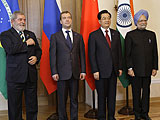Groupings Seek World Order Shift
By Sergei Blagov for ISN
By simultaneously hosting summit meetings of the BRIC nations (Brazil, Russia, India and China) and the Shanghai Cooperation Organization (SCO), Russia aimed to find more common ground between the world's emerging four-nation powerhouse and the Eurasian grouping.
The first formal BRIC summit adopted a joint statement on 16 June, calling for a fairer and more democratic world order and multilateral cooperation. The BRIC nations, representing some 40 percent of the world population and more than a quarter of the globe's territory, also advocated a rule of international law.
Simultaneously, BRIC officials argued their cooperation should not be directed against other states and it should have no confrontational overtones. Nonetheless, pledges of more democratic world order and multilateralism cooperation still sounded as implicit criticism of a perceived western dominance, seen as unilateral and hence illegitimate.
In the past decade, Moscow has been pursuing an informal grouping of Russia, China and India, in an apparent bid to challenge the West. With the latest addition of Brazil, BRIC nations apparently sought a greater voice in global affairs.
The summit of the SCO, which includes Russia, China, Kazakhstan, Kyrgyzstan, Tajikistan and Uzbekistan, also focused on security issues, terrorism and Afghanistan. The SCO prioritized regional security and stability by adopting the SCO anti-terrorism convention. The Yekaterinburg declaration of the SCO once again advocated the "multipolar" world order and a principle of equal security for all nations.
BRIC and the SCO apparently shared rhetoric of a democratic world order and multilateralism, indicating that both groupings would now move to forge closer ties. Meanwhile, in the past decade Russia's repeated pronouncements of the "multipolar" world have done little to prevent excesses of the perceived US unilateralism.
The SCO has long been seen as aiming to uniting Central Eurasia's nations in their opposition to the US presence in the region. In August 2007, SCO leaders adopted a joint statement, pledging to prevent instability in the region.
However, the SCO member states have been careful to avoid any clear manifestations of an anti-West stance. But the SCO still has the potential of taking on an even more anti-western overtone as Iran has repeatedly requested full SCO membership to replace its current observer status.
Not surprisingly, despite growing domestic turmoil Iranian President Mahmoud Ahmadinejad opted to travel to Russia to attend the SCO summit. The Iranian president lashed out at the unipolar world order and told the SCO summit that the "age of empires has ended."
Ahmadinejad's remarks seemed to be well received, and Russia described the disputed re-election of the president as an "internal affair," thus implicitly warning the West against interference in Iranian struggles.
Simultaneously, the SCO summit provided a convenient venue for security interaction between observer nations. Russian President Dmitry Medvedev, Pakistani President Asif Ali Zardari and his Afghan counterpart Hamid Karzai, who met at the sidelines of the SCO summit, pledged to unite in the battle against terrorism.
The SCO member states have prioritized security issues, they repeatedly pledged not to form a military bloc. However, the group's major military drill in Russia's Urals in August 2007 and plans for similar war-games in Kazakhstan later this year arguably indicated an apparent drift towards military and security agenda. The SCO repeated war games, carried out mainly by Russia and China, appeared designed to send message to the West not to interfere in Central Eurasia.
By flexing their diplomatic muscles, BRIC nations were understood to be aiming to demonstrate that the world order was undergoing significant changes. However, it remains to be seen whether mere pronouncements of multilateralism and democratic world order, shared by BRIC and the SCO, could entail any practical results and help sustaining global security.

